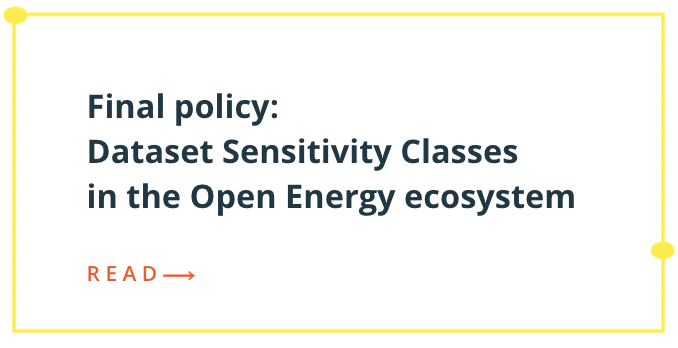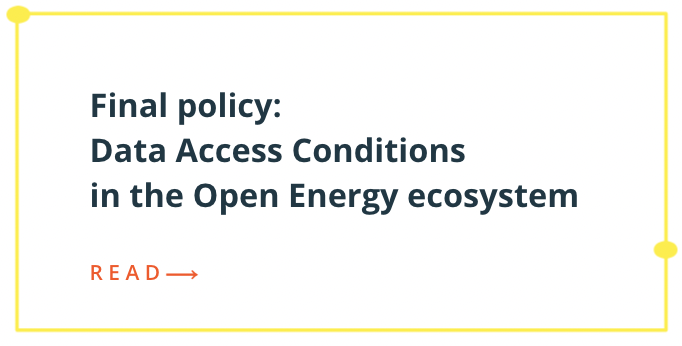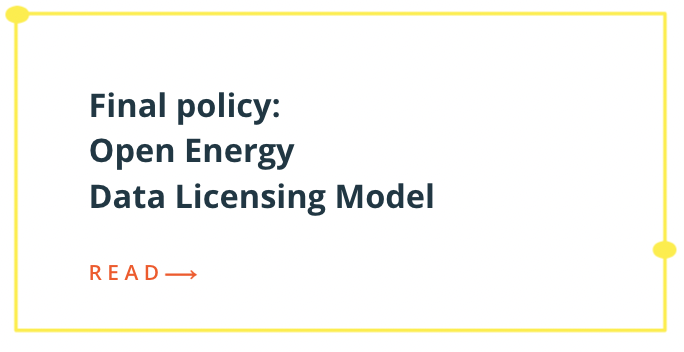Between March and June 2021, Open Energy conducted three public consultations to inform the design and development of core policies underpinning the Open Energy Governance Service (OEGS) for Shared data. Now all consultations have closed, and in line with our ethos of working in the open, we would like to feed back the outcomes of these consultations and to thank all who contributed.
All terms used in the blog are defined in the glossary here. All policies will also be published in the Phase 3 operational guidelines (forthcoming end July 2021). For any questions stemming from this blog, or materials within, please contact openenergy@ib1.org.
Data Sensitivity Classes
Open Energy facilitates sharing of a wide variety of data types, with varied levels of sensitivity. In order to handle this complexity, and to ensure data is appropriately protected, Open Energy has developed a system of data sensitivity classification. This policy details five Open Energy data sensitivity classes, graded across three dimensions of sensitivity: personal, commercial, and security. They are designed to complement Ofgem’s Data Best Practice guidance, by adding nuance to how Data Providers can classify types of Shared data.
Consultation during policy development informed a range of changes including:
- Reducing the number of classes from 6 to 5,
- Improving descriptions and example data types provided for each class; and
- Updating guidance regarding the classification of aggregated and anonymised personal data.
Details of public consultation feedback, and Open Energy’s responses, can be found here. A copy of the updated policy can be found here.
Data Access Conditions
Once Data Providers have allocated their datasets to appropriate sensitivity classes, they will then specify the access conditions for each dataset. To encourage the creation of access conditions that are fair and proportionate to the dataset’s sensitivity profile, data sensitivity classes will be used as a guiding basis for considering access conditions, though not a complete determinant. As such, we define a standardised range of access condition types that Data Providers can associate with a particular dataset. This acknowledges the need for more nuance than would be captured under a ‘one size fits all’ approach for each sensitivity class, while still enabling standardisation of condition types. The policy focuses on access conditions for classes OE-SA and OE-SB only as personal data (OE-SP) are out of scope for Open Energy Phase 3.
Consultation during policy development informed a range of adaptations including:
- Dividing group-based access conditions into externally defined and self defined types;
- Tightening the scope of use case-based access conditions to promote clarity and fairness; and
- Removing purpose-based access conditions to reflect coverage of these conditions elsewhere in ways that reduce implementation difficulties.
Details of public consultation feedback, and Open Energy’s responses, can be found here. A copy of the updated policy can be found here.
Data Licensing
This represents the final step of the journey that Data Providers must take in order to ready their datasets for sharing via Open Energy. It consists of two parts: creating access rules, then associating the grant of a set of capabilities and obligations with each rule to form the license. Our model proposes a system whereby access and capability grants are determined, for each request to a Data Provider’s API, on the basis of a set of rules defined and published by that Data Provider. This is different from the single licensing model that is commonly used in the sector, whereby one license is produced to cover all circumstances of the dataset’s use. It also responds to industry feedback regarding problems with the length and complexity of single licenses, which can increase cost, friction and risk associated with data use. By contrast, the Open Energy model permits reasonable multiple licensing within a set of transparent, standardised parameters that enable each license to be significantly simplified.
Consultation during policy development informed a range of changes including:
- Sharpening the descriptions of certain capabilities;
- Confirming use of the ‘data pyramid’ to support the definition of different levels of onward sharing permissions; and
- Honing a set of clarifications provided with the policy to support understanding.
Details of public consultation feedback, and Open Energy’s responses, can be found here. A copy of the updated policy can be found here.
What’s next?
In the next phase of development, Open Energy will produce guidance and tooling designed to support Data Providers to comply with Open Energy policies. We aim for this to build trust and fairness in the ecosystem, while making it as easy as possible for Data Providers to get up and running. The next phase of the project will also explore policy development around dispute resolution and we expect to hold a further public consultation on this topic in due course.



